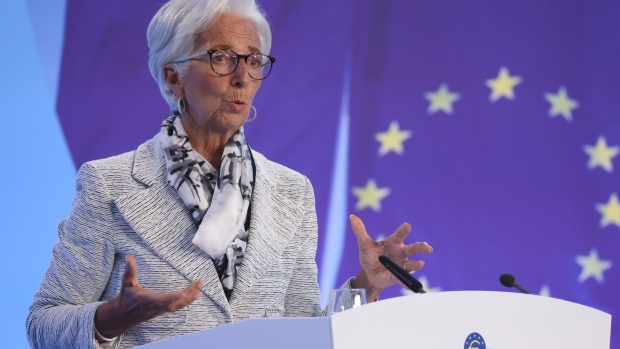Sep 26, 2022
Lagarde Says ECB Rates to Be Lifted at ‘Next Several Meetings’
, Bloomberg News

(Bloomberg) -- The European Central Bank will continue increasing borrowing costs, even with economic activity expected to “slow substantially,” according to President Christine Lagarde.
“We expect to raise interest rates further over the next several meetings to dampen demand and guard against the risk of a persistent upward shift in inflation expectations,” Lagarde told European Union lawmakers Monday in Brussels.
She warned that support for households and businesses by European governments has been too broad, suggesting it risks interfering with the ECB’s efforts to steer price gains back toward the 2% target from almost five times that now.
“There are more measures that are across the board than measures that are specifically tailored to the most in need,” Lagarde said. The approach is “not necessarily conducive to a well coordinated fiscal and monetary policy.”
Relentless inflation pressure driven by Russia’s war in Ukraine and the resulting energy crisis has prompted the ECB to start hiking rates for the first time in more than a decade -- this month by a historic 75 basis points. The question is how to proceed as the ramp-up in prices is accompanied by ever-increasing predictions of a recession.
In Germany, the biggest of the euro zone’s 19 economies, data Monday showed business confidence slumping further to its worst since the onset of the pandemic, with a downturn all but certain. Across the bloc, consumer confidence is at an all-time low.
ECB officials, however, say economic weakness won’t stop them from lifting rates further.
Vice President Luis de Guindos said earlier in the day that “reducing inflation is the main contribution we can have to improve the economic situation.” Lithuania’s Gediminas Simkus said a recession “doesn’t mean the Governing Council shouldn’t take decisions.”
Wage Dynamics
Money-market investors see the ECB delivering another three-quarter-point rate increase in October, with the deposit rate -- currently 0.75% -- rising beyond 2% by year-end. The next move will depend in large part on this month’s inflation reading, due Friday. Economists see prices jumping 9.7% from a year ago -- another all-time high.
Lagarde said ECB officials want to reach the so-called neutral rate of interest, which neither stimulates nor restricts the economy. At that juncture, they’ll decide whether further monetary tightening is required.
Policy makers officials must continue to monitor longer-term inflation expectations, which currently stand at about the ECB’s goal, she said. Salaries may still advance in light of the region’s jobs market and the steep trajectory of prices.
“Wage dynamics remain contained so far,” Lagarde said. “However, resilient labor markets and some catch-up to compensate for higher inflation are likely to push up wage growth.”
(Updates with Lagarde comments starting in third paragraph.)
©2022 Bloomberg L.P.






